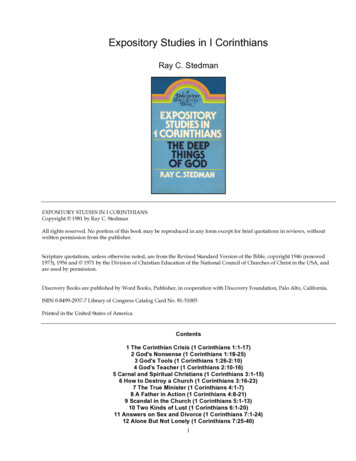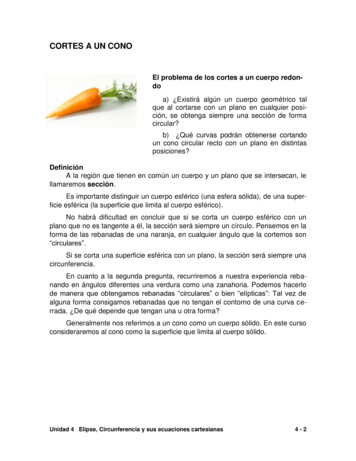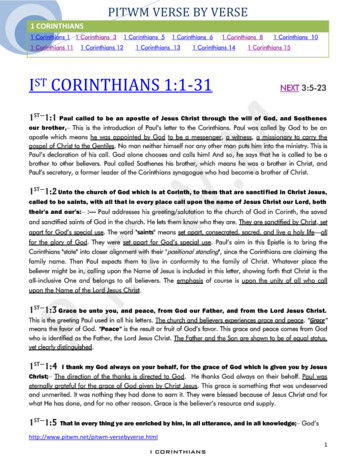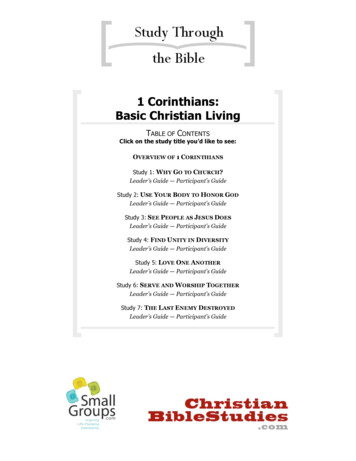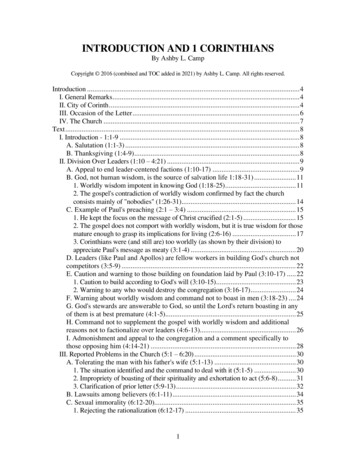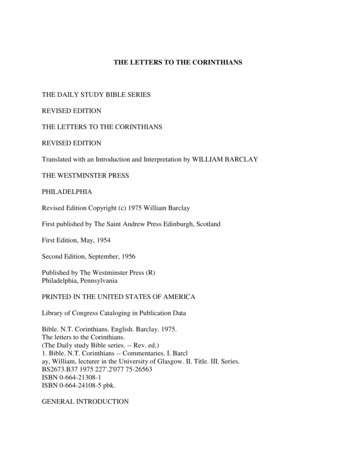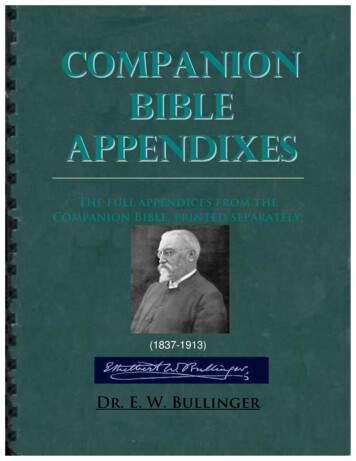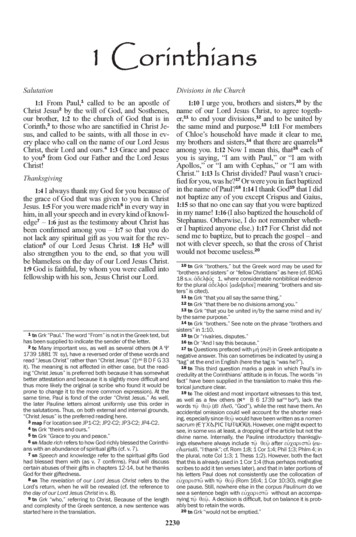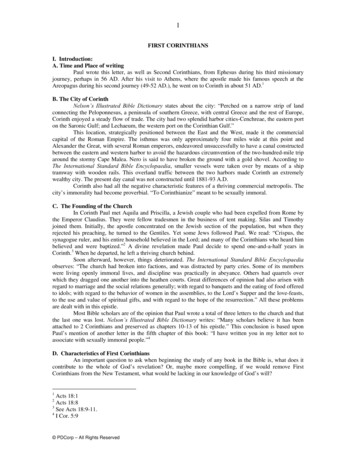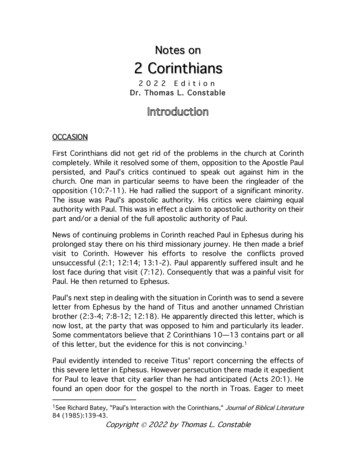
Transcription
Notes on2 Corinthians2 0 2 2 E d i t i o nDr. Thomas L. ConstableOCCASIONFirst Corinthians did not get rid of the problems in the church at Corinthcompletely. While it resolved some of them, opposition to the Apostle Paulpersisted, and Paul's critics continued to speak out against him in thechurch. One man in particular seems to have been the ringleader of theopposition (10:7-11). He had rallied the support of a significant minority.The issue was Paul's apostolic authority. His critics were claiming equalauthority with Paul. This was in effect a claim to apostolic authority on theirpart and/or a denial of the full apostolic authority of Paul.News of continuing problems in Corinth reached Paul in Ephesus during hisprolonged stay there on his third missionary journey. He then made a briefvisit to Corinth. However his efforts to resolve the conflicts provedunsuccessful (2:1; 12:14; 13:1-2). Paul apparently suffered insult and helost face during that visit (7:12). Consequently that was a painful visit forPaul. He then returned to Ephesus.Paul's next step in dealing with the situation in Corinth was to send a severeletter from Ephesus by the hand of Titus and another unnamed Christianbrother (2:3-4; 7:8-12; 12:18). He apparently directed this letter, which isnow lost, at the party that was opposed to him and particularly its leader.Some commentators believe that 2 Corinthians 10—13 contains part or allof this letter, but the evidence for this is not convincing.1Paul evidently intended to receive Titus' report concerning the effects ofthis severe letter in Ephesus. However persecution there made it expedientfor Paul to leave that city earlier than he had anticipated (Acts 20:1). Hefound an open door for the gospel to the north in Troas. Eager to meet1SeeRichard Batey, "Paul's Interaction with the Corinthians," Journal of Biblical Literature84 (1985):139-43.Copyright Ó 2022 by Thomas L. Constable
2Dr. Constable's Notes on 2 Corinthians2022 EditionTitus, who was taking the land route from Corinth back to Ephesus, Paulmoved west into Macedonia (2:12-13). There Titus met him and gave himan encouraging report (7:6-16). Most of the church had responded well toPaul's directives, and the church had disciplined the troublemakers (2:511). Unfortunately some in the congregation still refused to acknowledgePaul's authority over them (10:1—13:10).UNITYMany scholars have tried to explain the different subject matter and toneof chapters 10—13 as compared with chapters 1—9. Some believe thatchapters 10—13 were a separate letter, specifically Paul's severe letter.Others argue that these chapters were originally part of 2 Corinthians andthat Paul wrote the whole book at one time. Some scholars believe thatchapters 10—13 were originally a different letter from both chapters 1—9 and the severe letter. This would have made them a fifth letter from Paulto the Corinthians. Perhaps the best explanation is that chapters 10—13
2022 EditionDr. Constable's Notes on 2 Corinthians3were originally part of 2 Corinthians but that Paul wrote these chaptersafter he had written chapters 1—9 and after he had met Titus.1In chapters 10—13 Paul rejoiced at the repentance of the majority in thechurch. However his concern for the unrepentant minority, and his desireto pick up the money that the Corinthians had begun to collect for theirpoorer brethren in Jerusalem, led him to write 2 Corinthians. Along withthese primary motives Paul also felt compelled to refute the charge offickleness that had been leveled at him by his critics. He had changed histravel plans and had not come to see them as he had originally said that hewanted to do. This situation provided him an opportunity to clarify thenature of Christian ministry. Like 1 Corinthians, 2 Corinthians is an"occasional" letter: one occasioned by specific circumstances.DATEPaul wrote the Second Epistle to the Corinthians from Macedonia—perhapsfrom Philippi, Thessalonica, or Berea—probably in the fall or winter of A.D.56. A date a year earlier or later is possible.Some commentators believe that Paul wrote 1 Corinthians after his painfulvisit and after he wrote the severe letter. Others, and I, believe it is moreprobable that he wrote 1 Corinthians before these two events. It is verydifficult to reconstruct the details of Paul's activities since the dataavailable to us is incomplete.PAUL'S CORINTHIAN CONTACTS12Paul'sHisTheirPaul'sHisPaul'sfirst former letter Corinthians painful severe Corinthians futuretovisitlettervisitlettervisithim1SeeDonald A. Carson and Douglas J. Moo, An Introduction to the New Testament, pp.430-36. See Kenneth G. Hanna, From Gospels to Glory, pp. 209-11, for further discussionof the unity of the epistle.
Dr. Constable's Notes on 2 Corinthians42022 EditionAnother view is that the former letter is 1 Corinthians and the person whooffended Paul (2 Cor. 2:5; 7:12) is the incestuous man referred to in 1Corinthians 5:1.1"According to this view, there was 'no painful visit,' for theword 'again' in 2:1 does not necessarily mean that Paul madea visit between writing First and Second Corinthians. It simplymeans he did not want to return 'in sorrow.' The reference in12:14 and 13:1, 2 to a 'third time' does not mean Paul wascoming for his third time; it simply means that he was 'readyto come for a third time. He had planned to come (see 1 Cor.16:5-9), evidently was ready to come (12:14), and then didnot actually make the trip (1:15-17, 23)."2PURPOSEPaul's immediate purpose in writing 2 Corinthians was to combat theinfluence of Judaizers who promoted legalistic teaching. These teacherswere evidently Jews, mainly from Judea, who claimed to be Christians. Theymay have been unbelievers or misguided believers, but they claimed to beChristians. Acts 15:1 refers to them. God’s larger purpose in inspiring 2Corinthians was to make the gospel crystal clear.Kenneth Hanna noted five purposes: to console and encourage the majorityin the church, to restore the disciplined member of the church, to completethe collection for the saints in Jerusalem, to vindicate Paul's apostleship inview of criticisms, and to prepare for Paul's third visit to Corinth.3J. Sidlow Baxter observed that Romans, 1 and 2 Corinthians, and Galatiansfollow the order of 2 Timothy 3:16: Romans dealing mainly with doctrine,the Corinthians letters with reproof, and Galatians with correction.41E.g.,J. H. Bernard, "The Second Epistle to the Corinthians," in The Expositor's GreekTestament, 3:3-18.2The Nelson Study Bible, p. 1942.3Hanna,4J.pp. 215-16.Sidlow Baxter, Explore the Book, 6:127.
2022 EditionDr. Constable's Notes on 2 Corinthians5CHARACTERISTICS"While the epistle to the Galatians is the defence [sic] of thedoctrine of the Gospel against false teachers, the secondepistle to the Corinthians is the defence of his own personalcharacter, his apostolic authority, his motives and hisministry."1"It was written with a quill dipped in tears, from the apostle's'anguish of heart,' and contains more of human pathos thanany other of his letters."2"2 Corinthians is very different from the letters between whichit was written, 1 Corinthians and Romans. Whereas each ofthose letters is, in its own way, systematic and orderly, 2Corinthians is, on the face of it, uneven and digressive. It is nosurprise, therefore, that many scholars have suggested that 2Corinthians is really a collection of letters put together later asa single letter."3"Second Corinthians presents many inspiring texts andpassages to the reader and teacher of God's Word. A quicksurvey reveals approximately eighty individual verses lendingthemselves to extended meditation and exposition, apart fromthe sixty or so constituent paragraphs of the letter. This letteris a rich lode for the edification of God's people."4"In Second Corinthians Paul bares his heart and his life as hedoes in none of his other letters. This lends a special value tothe letter."51ArnoC. Gaebelein, The Annotated Bible, 3:2:149.6:121.3Paul Barnett, The Second Epistle to the Corinthians, p. 15. Cf. Alfred Plummer, A Criticaland Exegetical Commentary on the Second Epistle of St. Paul to the Corinthians, p. xiii.4Barnett, p. 47.5Richard Lenski, The Interpretation of St. Paul's First and Second Epistles to theCorinthians, p. 804.2Baxter,
Dr. Constable's Notes on 2 Corinthians62022 Edition"Of all the Pauline epistles, 2 Corinthians is probably the onewhich presents most problems to the interpreter."1C. K. Barrett called 2 Corinthians " surely the most difficult book in theNew Testament."2 He meant the most difficult to interpret.OUTLINEI.Introduction 1:1-11A.B.Salutation 1:1-2Thanksgiving for comfort in affliction 1:3-111.2.II.Thanksgiving for comfort 1:3-7Thanksgiving for deliverance 1:8-11Answers to insinuations about the sincerity of Paul's commitment tothe Corinthians and to the ministry 1:12—7:16A.Defense of Paul's conduct with regard to his promised visit andthe offender 1:12—2:171.2.B.Exposition of Paul's view of the ministry 3:1—6:101.2.3.4.C.1Editor'sThe postponement of the intended visit 1:12—2:4The treatment of the offender and the result of thesevere letter 2:5-17The superiority of Christian ministry to Mosaic ministry3:1-11The great boldness of the new ministers 3:12—4:6The sufferings and supports of a minister of the gospel4:7—5:10The life of a minister of Christ 5:11—6:10Appeal for restoration of the Corinthians' confidence in Paul6:11—7:16preface to the second edition of Philip E. Hughes, Paul's Second Epistle to theCorinthians, p. xi.2C. K. Barrett, A Commentary on The First Epistle to the Corinthians, p. v.
2022 Edition1.2.III.An appeal for large-heartedness and consistency 6:11—7:4The encouraging response of the Corinthians so far 7:516TheTheTheTheTheexample of the Macedonians 8:1-7supreme motive for giving 8:8-15delegates of the churches 8:16-24anticipated visit of Paul 9:1-5benefits of generous giving 9:6-15Appeals concerning Paul's apostolic authority 10:1—13:10A.Replies to charges made against Paul 10:1-181.2.3.B.C.Reply to the charge of cowardice 10:1-6Reply to the charge of weakness 10:7-11Reply to the charge of intrusion 10:12-18Claims made by Paul 11:1—12:181.2.3.4.5.Paul's reasons for making these claims 11:1-6Freedom to minister without charge 11:7-15Paul's service and sufferings 11:16-33Special revelations Paul received 12:1-10Paul's supernatural miracles and paternal love 12:11-18Exhortations in view of Paul's approaching visit 12:19—13:101.2.V.7Instructions concerning the collection for the poor saints in Judea8:1—9:15A.B.C.D.E.IV.Dr. Constable's Notes on 2 CorinthiansPaul's concerns 12:19-21Paul's warnings 13:1-10Conclusion 13:11-14A.B.C.The exhortation 13:11-12The salutation 13:13The benediction 13:14
Dr. Constable's Notes on 2 Corinthians82022 EditionWick Brommall’s simple, memorable outline is worth noting:1I.II.III.The conciliation 1:1—7:16The collection 8:1—9:15The credentials 10:1—13:14So are Hanna's main divisions: consolation (chs. 1—7), solicitation (chs.8—9), vindication (chs. 10—13):2Baxter's outline is a bit more expanded:3Introduction 1:1-2I.Paul's account of his ministry chs. 1—5 (Explanation: Paul theminister)a.b.II.Paul's appeal to his converts chs. 6—9 (Exhortation: Paul thefather)a.b.III.As to the motive chs. 1—2As to the message chs. 3—5Concerning things spiritual chs. 6—7Concerning things material chs. 8—9Paul's answer to his critics chs. 10—13 (Vindication: Paul theapostle)a.b.The critics and their pretensionsThe apostle and his credentials.Conclusion 13:11-141WickBroomall, "The Second Epistle to the Corinthians," in The Wycliffe BibleCommentary, p. 1262-63.2Hanna, p. 207.3Baxter, 6:126.
2022 EditionDr. Constable's Notes on 2 Corinthians9MESSAGEThe subject of 2 Corinthians is ministry, specifically the church's work ofservice in the world. This is the central concept that Paul dealt with in thisepistle.What did he say about Christian ministry? He spoke about two aspects ofministry: the nature of Christian ministry, and the practice of Christianministry.I will comment first on what Paul revealed about the nature of Christianministry, what ministry is in and of itself. This is what Paul spoke of mostoften in 2 Corinthians. In 1 Corinthians there is more emphasis on thepractice of ministry than on the nature of ministry. In both epistles Pauldealt mainly with the doctrine of ecclesiology: the church.Paul had a lot to say about the authority of the church's ministry. JesusChrist is the church's authority. He is the One who assigns each believer hisor her particular ministry within the body of Christ (cf. 1 Cor. 12:11, 18,28; Eph. 4:11-13). The Corinthian church had a major problem becausesome in its company were failing to accept Paul's appointment by Christ asan apostle—and their own appointment as non-apostles. This was apractical repudiation of Jesus Christ's authority in the church. We must bowto the authority of Christ in the church by recognizing and respondingappropriately to those whom He has appointed to various roles in the body.We identify these people by their gifts (divinely-given abilities) and by theiroffices (divinely-given positions).Paul also had a lot to say in this epistle about the resources of the church'sministry. He emphasized three resources primarily:One important resource is the encouragement of God. Paul spoke of this inthe first part of the epistle especially. We read "comfort" in many Englishtranslations, but the Greek word paraklesis means comfort throughencouragement. The same Greek root describes the Holy Spirit as ourHelper, Comforter, Advocate, or Intercessor in John 14—16. Paul bothtaught and demonstrated in this letter that God's encouraging comfortalways exceeds our discouragement and distress in ministry. The secret tofinding it sufficient is taking God's view of how our ministry is reallyproceeding. This viewpoint Paul revealed too.
10Dr. Constable's Notes on 2 Corinthians2022 EditionA second resource is divine revelation. Paul did not preach himself or amessage that he had concocted. He preached what God had revealed. Thusrevelation constituted both Paul's public message and his personalencouragement. We Christians too have received the same message tocommunicate as ambassadors of Christ. It is a message of reconciliation,and it is the source of our encouragement.A third resource is the prayers of the saints. Paul called for, and countedon, the prayers of God's people to bring God's power into play through himas he ministered (1:11a). He realized that his own prayers would not moveGod to work as well as the concerted prayers of many of God's children (cf.James 4:2). Lack of prayer is often a sign of confidence in self more thanconfidence in God.In addition to the authority and resources of Christian ministry, Paul alsohad a lot to say in this epistle about experience in ministry. Three featuresmark experience in ministry:First, one thing that marks ministry is tribulation. Paul spoke extensively in2 Corinthians about the afflictions that he experienced during his ministry.Furthermore he revealed that these are part of ministry, anyone's ministrywho is carrying it out as God has directed. Some people do not welcomethe gospel. To them it is as distasteful as the smell of a dead body. Weshould expect to experience tribulation in ministry. Almost all Christianswho share the gospel with others have experienced this to some extent.Second, another thing that marks our ministry as Christians is hope. Godhas revealed the end of our ministry. Faithful believers will all stand beforeJesus Christ and receive rewards one day (5:10). This hope is a certainty.The Christian who loses sight of his or her hope is going to drift and sufferdiscouragement rather than pressing on toward the goal (Phil. 3:14). Theend of our ministry is constantly in view in this epistle.Third, another component of Christian ministry is triumph. Paul revealedand illustrated, by his own attitude, that no matter how the response toour ministry may appear to us, our ministry is always triumphant. Thereason for this is that God is always at work through His ministers. One ofthe problems that Paul's critics in Corinth had, and that we sometimeshave, is that they were evaluating ministry superficially rather thanrealistically. We need to evaluate ministry on the basis of what God hasrevealed is really happening, not what appears to be happening.
2022 EditionDr. Constable's Notes on 2 Corinthians11Paul not only revealed much about the nature of Christian ministry in 2Corinthians, but he also revealed a lot about the practice of ministry by thechurch in the world. Three emphases predominate:First, Paul revealed what the message of the church is, namely, the revealedWord of God. Ours is a ministry of the Word. In his day, God's Wordconsisted of the Old Testament Scriptures plus the revelations that he andthe other New Testament prophets had received that were for allChristians. Paul contrasted his message, and ours, with the message ofMoses, and he rejoiced in its superiority. We can now see God's glory clearlyrevealed in the person of Jesus Christ (cf. Heb. 1).Second, Paul revealed the church's equipment to carry on its ministry tothe world. We are ready to minister only when we separate from the world'ssins and conform to God's will. Paul contrasts with his critics in this letterin both of these respects. As these characteristics mark us, we too, will beready to minister.Third, Paul revealed the exercise of the church's ministry to the world. Inexercising its ministry, the church does three things, according to thisepistle:First, it exercises discipline to restore the erring brother to effectiveministry. Paul's great concern in this epistle was the restoration of therebellious critics in the Corinthian church, restoration to unity andusefulness.Second, the church also is to give no occasion of stumbling to others. Paul'sconcern was that the behavior of the Corinthian Christians would be anencouragement to other believers and a base from which the gospel couldproceed even farther into unevangelized regions beyond Corinth.Third, the church exercises the grace of giving. It seeks to facilitate theprinciple of equality that God has demonstrated throughout history,namely, that those who have should share with those who have not. Thisapplies not only to the gospel message but also to the physical necessitiesof life (chs. 8—9).From these emphases the message of the book emerges: The church needsto submit to revealed authority, to draw upon supernatural resources andequipment, and to experience triumph through tribulation as it executes its
12Dr. Constable's Notes on 2 Corinthians2022 Editionmission. As it does so it will effectively carry out its ministry of proclaimingthe message of reconciliation to the world.11Adapted47.from G. Campbell Morgan, Living Messages of the Books of the Bible, 2:1:131-
2022 EditionI.Dr. Constable's Notes on 2 Corinthians13INTRODUCTION 1:1-11Like most of Paul's epistles, this one begins with a salutation to therecipients. Then words of thanksgiving to God for His encouraging comfortfollow.A.SALUTATION 1:1-2This salutation contains the three elements common in all of Paul's epistlesand other correspondence of his day: the writer, the addressees, and agreeting."This salutation exhibits undoubted resemblances in form tosecular letters that have come down to us from the sameperiod. But the differences are greater, and that in threerespects. There is the firm assertion of Apostolic authority, theclear indication that those whom he addresses are not ordinarypeople but a consecrated society, and the spiritual characterof the good wishes he sends them."11:1Students of Paul's epistles have suggested variousexplanations of why the apostle preferred to use his name Paulrather than his name Saul. Some say that he did so to markthe spiritual conquest of Sergius Paulus (Acts 13:6-12).Others claim that he did so to show himself the least of theapostles, since "Paul" means "little" (cf. Eph. 3:8; 1 Tim.1:15). The meaning of "Paul" has led some to think that hewas small in physical stature. Perhaps he did so because theGreek form of the Hebrew name Saul was objectionable, sinceit was identical with an adjective that meant effeminate. Hemay have done so simply because it was customary for Romancitizens to bear a Roman name as well as one that reflectedtheir own nationality.2 Since Paul's ministry was mainly among1Plummer,2Seep. 5. See also W. G. Doty, Letters in Primitive Christianity, pp. 21-47.Hughes, pp. 1-2.
Dr. Constable's Notes on 2 Corinthians142022 EditionGentiles he may have preferred to use his Roman name ratherthan his Jewish name.Paul's use of the term apostle (lit. one sent forth with orders)so early in his salutation sets the tone for the entire epistle. Itis largely a vindication of his apostleship. He claimed apostolicauthority at once.Often Paul mentioned his apostleship in his epistles in order tolend authority to what he wrote, especially when that authoritywas being challenged by some of his readers. But RichardLenski insisted that Paul's purpose was primarily to express hisown consciousness of bearing a heavy responsibility withregard to his readers.1 Probably Paul had both purposes inmind.The Lord's title is also significant though not unusual. Paulcalled Him Christ (God's Anointed One sent forth as the apostlefrom heaven; v. 20; cf. Heb. 3:1; John 20:21) and Jesus (Godin action delivering His people from their sins, Savior; 5:19; cf.Matt. 1:21).Paul claimed that his apostleship came to him by the will ofGod, not by his own or the church's initiative (cf. John 1:13;Gal. 1:1; Eph. 2:8). The gift and office of apostle were specialin the early church. Only 12 individuals plus Paul were officialapostles (1 Cor. 15:8; Acts 1:21-22; 9:15). However the wordapostle occurs elsewhere in the non-technical sense of anyonesent on God's great mission of spreading the gospel (cf. 8:23;Acts 14:4, 14; Phil. 2:25; et al.).The recipients of this epistle knew Timothy well (v.19, Acts18:5). He had come to faith in Christ evidently through Paul'sministry in Lystra in Asia Minor (Acts 14:8-20; 1 Tim. 1:2; 2Tim. 1:2). He had accompanied Paul on his journeys from thesecond missionary journey on (Acts 16:1-3), and he had goneto Corinth as the apostle's representative (1 Cor. 4:17;16:10).1Lenski,pp. 806-7.
2022 EditionDr. Constable's Notes on 2 Corinthians15Paul noted in passing that the church (Greek ekklesia, lit. calledout ones, in this case the company of Christians) belongs toGod. Even though it was at Corinth it was God's church. It didnot belong to the Corinthians or their teachers. Therefore itsprimary allegiance had to be to Him.Corinth was an important commercial center. The city mayhave contained over a half-million inhabitants at this time.1 Itstood on the narrow land bridge (isthmus) that connected thesouthern part of Greece (the Peloponnesus) with the northernpart. The southern part and some of the northern partcomprised the Roman province of Achaia, while the provinceof Macedonia lay immediately to the north of Achaia. Corinthwas not only the chief city through which land commercepassed north and south, but it was the center for seacommerce and travelers going east and west.To the east the Saronic Gulf of the Aegean Sea brought shipsto Corinth. From there stevedores transferred their cargoesoverland a few miles to ships in the Corinthian Gulf of the IonianSea. This shortcut saved merchants the long trip around thesouthern coastline of Greece. Corinth was the capital of theprovince of Achaia and the headquarters of a Roman proconsul(governor). It had been the notorious center for the immoralworship of the goddess Aphrodite, and its population wascosmopolitan, consisting of Romans, Greeks, Orientals, andJews.Paul and his missionary band had established a church inCorinth on his second missionary journey (Acts 18). Jews andGentiles comprised it. Paul had labored in Corinth a year and ahalf then. Due to the influence of its culture, as well as that offalse teachers, the church experienced many temptations anddifficulties. I outlined Paul's dealings with this church, followingits founding, in the introduction to this exposition above. Insummary, Paul seems to have visited Corinth three times, and1HomerA. Kent Jr., A Heart Opened Wide, p. 27.
16Dr. Constable's Notes on 2 Corinthians2022 Editionthe New Testament refers to four letters that he wrote to thischurch.1Paul called the addressees saints (Gr. hagioi, lit. holy ones,those set apart for God, cf. 1 Cor. 1:2)."All Christians are 'holy' in virtue, not of their lives,but of their calling; they are set apart in a holySociety as servants and sons of the Holy God."2Paul intended that the Corinthian Christians would read thisepistle in the church, but he also wanted all the Christians inthe province of Achaia to read it. We know that at this timethere was another church in nearby Cenchrea (Rom. 16:1) andthere may have been one in nearby Athens (Acts 17:34).31:2This greeting expresses Paul's wish that God's grace and peacewould be his readers' portion. He named these benefits in theintroductions to each one of his epistles. He meant sustaininggrace rather than saving grace, and the peace of God ratherthan peace with God."'Grace to you' means: May God and the Lord giveyou an abundance of their undeserved gifts."4"In the protocol of salvation, recognized even in asalutation, grace always precedes peace. Theformer is the basis and foundation of the latter;therefore, the order cannot be changed. No mancan have peace who has not previouslyexperienced divine grace (cf. 8:9)."51SeeDonald Guthrie, New Testament Introduction, 2:48-61; Plummer, xiii-xix; Hughes, xvixix; and Batey, pp. 143-6.2Plummer, p. 3.3Quotations from the English Bible in these notes are from the New American StandardBible (NASB), 2020 edition, unless otherwise indicated.4Lenski, p. 810.5Broomall, p. 1261.
2022 EditionDr. Constable's Notes on 2 Corinthians17"Grace and peace, the favour of God and its fruits,comprehend all the benefits of redemption."1The combination of grace and peace in Paul's greeting, bothhere and elsewhere, unites Greek and Semitic terms to form anunconventional greeting (cf. Rom. 1:7; 1 Cor. 1:3; Gal. 1:3;Eph. 1:2; Phil. 1:2; Col. 1:2; 1 Thess. 1:1; 2 Thess. 1:2; Phile.3; 1 Pet. 1:2; 2 Pet. 1:2). Though the general structure of thesalutation was typical of the day, the terms that Paul usedwere uniquely Christian.2The familiar language of this verse implies the deity of JesusChrist. Jesus is, along with God the Father, the source of graceand peace."This could not be so were He a created entity andnot the co-eternal and consubstantial Son."3Furthermore Jesus is Lord. The Septuagint, which uses thistitle to translate the name Yahweh in the Old Testament, mayhave influenced Paul to use it also for Jesus Christ.4 Thecontemporary religious terminology of oriental Hellenism(ancient Greek culture) also used this title to denote deity.Whatever the influences on Paul may have been, the term Lordundoubtedly implied the deity of Christ.5B.THANKSGIVING FOR COMFORT IN AFFLICTION 1:3-11In this pericope (section of text) Paul gave thanks to God for the comfort(vv. 3-7) and deliverance (vv. 8-11) that he had experienced recently. Hewanted to enable his readers to appreciate what he as an apostle hadendured for Christ and the super-abounding comfort that God supplied tocompensate for all the afflictions that he had suffered for His sake.1CharlesHodge, An Exposition of the Second Epistle to the Corinthians, p. 4.Judith Lieu, "'Grace to You and Peace': The Apostolic Greeting," Bulletin of the JohnRylands University Library of Manchester 68:1 (Autumn 1985):161-78.3Hughes, p. 7.4The Septuagint is the Greek translation of the Hebrew Bible (our Old Testament) thatwas made in the third century B.C.5See J. Greshem Machen, The Origin of Paul's Religion, p. 198.2See
Dr. Constable's Notes on 2 Corinthians182022 Edition"It [this section] is no mere amiable preamble intended only tocushion the sterner matters which the Apostle is shortly tobroach. On the contrary, it is very much of a piece with themajor theme of the opening portion of this epistle, namely,Paul's vindication of his own integrity."1Paul's main concern in this section was that his readers learn the values ofhis experiences, not just the facts concerning what had happened to him.Consequently he dealt with these first. He shared the effects of hisexperiences (vv. 3-7), and then told them about one experience (vv. 811).Paul's almost invariable practice of following salutation with thanksgiving inhis epistles was a common feature of secular letters in his day.2 Comparedwith his other epistles, however, there is some difference in thisthanksgiving."St. Paul usually thanks God for some grace bestowed on thosewhom he addresses, and hence his omission of theThanksgiving in the stern letter to the Galatians; here and in 1Tim. 1:12 he gives thanks for benefits bestowed on himself.But his readers are not forgotten (vv. 6, 7); it is largely ontheir account that he is so thankful."31.Thanksgiving for comfort 1:3-7The Greek word translated blessed (eulogetos) occurs eighttimes in the New Testament, mostly in Paul's writings. It alwaysoccurs with the mention of God. It expresses both gratitudeand adoration (cf. Eph. 1:3; 1 Pet. 1:3).1:3"Adored be God! is the expression of the highestveneration and thankfulness."4To Jesus Christ, God is both God and Father (cf. John 20:17).In His humiliation as a man Jesus related to God as His God (cf.1Hughes,p. 9.p. 5.2Plummer,3Ibid.4Hodge,p. 4.
2022 EditionDr. Constable's Notes on 2 Corinthians19Mark 15:34). However within the Godhead, God was Jesus'Father (cf. Heb. 10:7). In other words, God was the God of thedependent Jesus in His human nature, but He was the Fatherof the infinite Christ in His divine nature (c
4 Dr. Constable's Notes on 2 Corinthians 2021 Edition Another view is that the "former letter" is 1 Corinthians, and "the offender" (2 Cor. 2:5; 7:12) is the incestuous man of 1 Corinthians 5:1.1 "Acco
